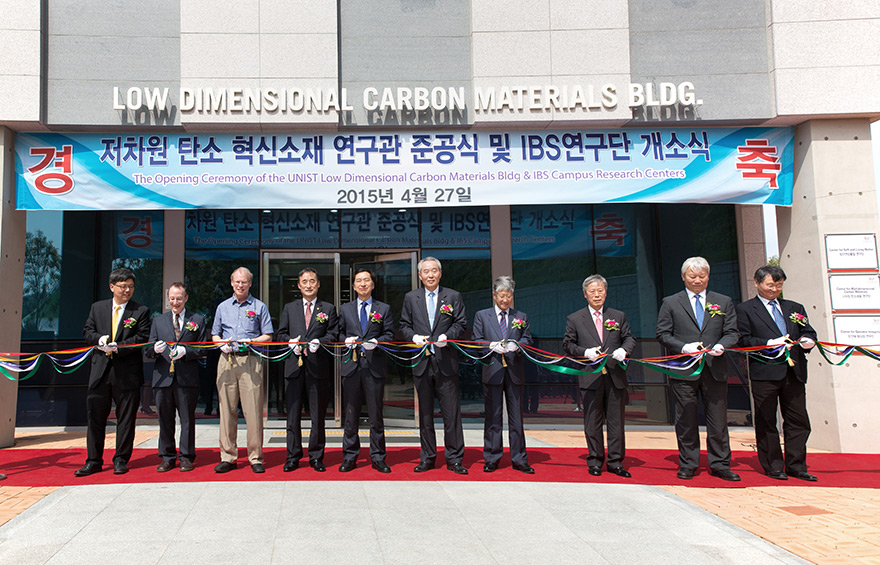| Title of announcement | UNIST Celebrates Completion of New Research Building and Opening of IBS Research Centers | ||||
|---|---|---|---|---|---|
| Business forms | Academic Events | Expiration date for bidding | |||
| Department in charge | 전체관리자 | Registration Date | 2015-04-29 | Hits | 3446 |
| att. | |||||
|
|
|||||
|
Prestigious members of the Institute for Basic Science (IBS) were invited to attend a formal ribbon cutting ceremony on April 27, 2015 at the Ulsan National Institute of Science and Technology (UNIST) to celebrate the completion of their Low Dimensional Carbon Materials Building. This important occasion was also an opportunity to formally introduce the three, specialized IBS research centers (Centers) hosted by the university.
To date, IBS has successfully launched 24 Centers of various types, each headed by internationally respected scientists; those located at UNIST or at other national science and technology universities are known as IBS campus research centers (Campus Centers). In his congratulatory speech, the IBS President Doochul Kim, thanked UNIST for hosting the three directors from abroad, which has greatly assisted IBS’ mission of becoming a global research institute. “I hope this new building will be a venue for groundbreaking research and creative knowledge, and that these three IBS Centers will grow into a global research hub,” said President Kim.
IBS has selected just such scientists to head the three Campus Centers currently hosted by UNIST: Dr. Steve Granick, Director of the Center for Soft and Living Matter; Dr. Rodney S. Ruoff, Director of the Center for Multidimensional Carbon Materials; and Dr. Kyungjae Myung, Director of the Center for Genomic Integrity.
The three directors made brief, formal introductions
about their research centers and after the ceremony, shared some of their
personal thoughts about the significance of the event. Part of IBS’ vision is fostering young scientists; Dr. Granick promotes this idea by calling himself a “coach”. “My goal is to achieve science, scientific results and even more importantly to train the next generation of scientists. We want to bring out the creativity of the Korean people, which sometimes in the hierarchical system of old Korea, is too hard to express”.
Dr. Kyungjae Myung is an internationally renowned scientist and is the most recent of the distinguished professors to be selected to direct a Campus Center at UNIST. As head of the Center for Genomic Integrity, Dr. Myung has been focusing on genome stability and chemotherapeutic application. Moreover, his studies on DNA repair pathways are expected to make great headway in cancer research.
World-leading scientist in synthetic polymer chemistry, Dr. Christopher W. Bielawski, described the ceremony as “a great day, not just for the university, but for Ulsan itself”. Dr. Bielawski is also located in the new Low Dimensional Carbon Materials Building, the completion of which signifies a big step for UNIST, the City of Ulsan and IBS, towards creating an international platform to promote basic science research in Korea. |
|||||
